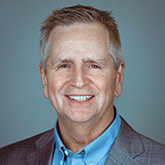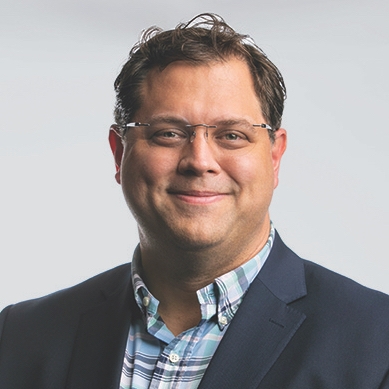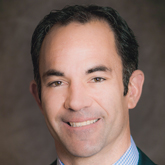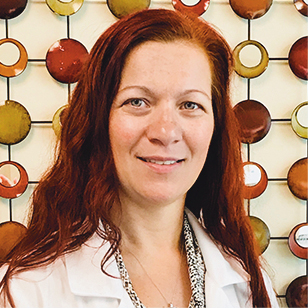How will this growing technology impact healthcare?

Artificial intelligence (AI) is a popular buzzword these days, promising sci-fi-type transformation to many aspects of society, including how we diagnose, treat and monitor patients in healthcare. But what is AI? “The term artificial intelligence means different things to different people. Where it stands today, I believe it’s referring to an analytical tool that we can apply to data sets in healthcare. It can be used to aid decision-making and to assess patterns from large data sets that humans might have difficulty making sense of,” says HealthTrust Physician Advisor Michael Hicks, M.D., National Medical Director of HCA Healthcare’s Surgery Center Division.
AI’s ability to quickly and accurately analyze the large amounts of information collected in healthcare is at the heart of its value, helping clinicians identify trends and insights that might otherwise be overlooked.
“Think about a world where clinical decisions are not based on one static piece of data, like a single blood pressure measured in your office, but instead on hundreds or thousands of blood pressures that have been collected as your patient goes through life,” muses Dr. Hicks. “As an individual, you’re not going to do anything with hundreds or thousands of blood pressures or heart rates or EKGs, but the AI is going to take all of those and make sense of them and give you a better opportunity to help your patient.”

The potential applications of AI in healthcare are just beginning to emerge, from scanning radiological images for early disease detection and chatbots used for patient communication to technology that creates personalized treatments and more.
HealthTrust Physician Advisor Jeffrey Carter, M.D., is the Medical Director at the University Medical Center New Orleans Burn Center. He believes that AI holds the key to meeting the increasing demands on the healthcare system: “The U.S. has about 5% of the world’s population, with around 15% of the world’s nurses and 25% of the world’s doctors. We have a growing number of informed patients expecting high-value care in a system with low efficiency and accuracy. AI can help improve those metrics by empowering providers with information to make better decisions.”
AI in action

Spinal deformities
Shay Bess, M.D., is a spine surgeon at the Denver International Spine Center and National Medical Director for Spine Research, Outcomes and Quality for HCA Healthcare. He is also a HealthTrust Physician Advisor and president of the nonprofit research organization International Spine Study Group Foundation, which is working to establish best methodologies to assess patients, evaluate risk and then predict outcomes.
Treating spinal deformities requires determining which aspect of the deformity is generating the most pain in order to correct it, while making sure not to over-correct and perform an exceedingly invasive surgery. The foundation is conducting five research studies on scoliosis and spinal deformities in adults and the use of artificial intelligence.
“We have utilized our research data set to create an online tool where we can then feed in variables to assess, for example, the best treatment options and how many levels should be fused in the spine of a 75-year-old patient with scoliosis. Or if they’re at too high of a risk, how we can optimize patient morbidities, such as diabetes or weight, to help improve outcomes and reduce the risk of complications,” explains Dr. Bess.
“There’s a tremendous opportunity right now with data to use the appropriate statistical platforms to generate predictive algorithms. This will present appropriate choices for patients and improved outcomes for both patients and health systems,” says Dr. Bess.

Heart arrhythmias
The growth of consumer wearable medical devices to measure heart rate and rhythm—and the increasing sophistication of the AI working with it—is an important area. HealthTrust Physician Advisor Genevieve Everett-Sigwalt, M.D., an electrophysiologist with the University of Pittsburgh Medical Center, already sees this technology at work in her field.
“It’s an important benefit that we have a way to monitor arrhythmias and evaluate patients for potential arrhythmias within the broader population,” explains Dr. Everett-Sigwalt. “AI is not just for people who are already sick with heart disease or hypertension or those who arrive at a hospital after having a stroke, and we then put a device on to monitor them. Using AI to prevent initial events will be a tremendous improvement in the way we can treat people.”
“Compared to five years ago, medical professionals are getting much more information than they used to because the technology is significantly more accurate and the information increasingly usable—even so far as eliminating the need for patients to undergo testing if the tech device has already recorded what data is needed.” In addition, clinicians might be receiving data they may not have been able to access in the past.
“Especially in my specialty, where patients can have very sporadic arrhythmias, we would take people for procedures without having them documented. That was considered a normal practice and standard of care,” says Dr. Everett-Sigwalt. “But now it’s very rare that we don’t have documentation, either from their watch or some other device, where we’re able to already have an event captured and a preliminary diagnosis.”
Burn care
UMC Burn Center is one of about a dozen burn centers conducting research into the use of artificial intelligence—specifically, image-based algorithms—to help assess burns and wounds. With many parts of the U.S. lacking specialized burn care, this could improve timely diagnosis and appropriate treatment in those areas.
“Artificial intelligence has the potential to aid burn assessment through imaging algorithms that can improve our accuracy when evaluating wounds, reducing unnecessary transfers. This type of AI is decision augmentation that creates synergy between the provider’s human knowledge and understanding of the clinical and social situations and the machine’s capability to indiscriminately analyze large volumes of data to help with complex decisions,” explains
Dr. Carter.
This type of AI could also be used in other areas, such as chronic wound management, by helping to assess debridement and wound bed viability, or to offer various treatment suggestions.
Potential pitfalls
With any shiny, new technology comes the excitement for its possibilities. But potential pitfalls in its application and implications must also be considered. Some of the concerns associated with AI relate to data privacy and security, a lack of transparency in AI tools and its reliability and limitations.
“While AI can generate answers very quickly for you, it’s not going to generate the appropriate questions by itself. You must be cognizant and ask the most appropriate questions and interpret the data appropriately. Otherwise, you’ll get to an answer very quickly, but it might be the wrong answer,” says Dr. Bess.
Despite the growing sophistication of AI, it still requires humans to provide accurate and sound data, train the algorithms, ask the right questions, and then interpret the results. And while it might seem that AI would be free from human subjectivity and bias, the reality is that these human flaws can be replicated in AI. It comes down to the amount and type of data used to train the AI.
Dr. Hicks shares: “We need to be conscious about introducing a bias into the artificial intelligence that would give us results that we don’t want. Or if it’s a population-based AI, it needs to consider all of the folks who make up the population, not just elderly white males, which is who research has tended to focus on historically.”
Other concerns are related to the lack of regulations addressing the safety, legal and ethical issues around AI in healthcare. With AI developing rapidly, discussions around who oversees it and who is ensuring that it’s being used for the common good are imperative.
“If you feed in a person’s data set, and predictive analytics say when that person might get sick and die, what do you do with that information? Is that something a person would want to know when they’re 20? It might make them unemployable, uninsurable, undatable,” says Dr. Hicks. “There are some real ethical and moral dilemmas here that we must think through.”
The clinician in an AI world
Dr. Hicks believes that AI will change healthcare so fundamentally that even the role of the clinician will need to be reimagined.
“Artificial intelligence is going to change the way clinicians currently interact with patients and the way we see ourselves as care providers. It might also change the way the rest of the world, including our patients and their families, sees us,” he says.
He uses the example of how some classic professions, such as clergy, law and medicine were elevated because of their roles as holders of knowledge. “The reason you went to see a lawyer, your priest or a physician, was because that person had the knowledge you needed to access,” Dr. Hicks says. “That has become problematic for us in healthcare in several ways. First and foremost, it’s impossible for clinicians to know everything there is to know, even within a specialty. That means I cannot apply everything there is to know to keep you, your family or a population healthy. I think that’s where artificial intelligence will have its most meaningful impact.”
If AI becomes the new ‘holder of knowledge,’ a clinician’s role might focus on knowing how to access that insight and data and then how to apply it, using their judgment and clinical experience.
This would mean a huge shift in the role of clinicians. “As AI in healthcare gets better and delivers higher-quality information, I could easily see a patient walk into their primary care provider’s office with an accurate diagnosis because they’ve entered their symptoms into an AI platform. So, what then is my role as a physician?” asks Dr. Hicks. His answer? A care coordinator, a coach, a counselor or someone who makes sense of what is available in terms of diagnosis and treatment options.
“When the AI can reveal you have a high likelihood of this disease and these are your best options for treatment, my job may become helping you walk that road, traversing the path and doing so in a way that’s emotionally meaningful and that is efficient in terms of how decisions are made and how things get implemented.”
A future of possibilities
How might AI improve patient care and impact the healthcare industry in years to come?
On the wish list for Dr. Bess is a digital interface that captures data when a patient is registered into a clinic or a hospital and then uses an algorithm-based AI to find options for treatment and to optimize a patient’s outcomes.
Dr. Everett-Sigwalt would like to see AI incorporated into existing tools, such as EKGs and stress tests, to improve testing and diagnosis. “If we could look at an EKG of a patient with chest pain and see that it’s similar to EKGs of other people with coronary artery disease, or that it doesn’t look like an EKG of a cardiac patient but actually related to the lungs, we could move our patients in the right direction sooner, getting them to the pulmonologist instead of the cardiologist if that’s more appropriate,” she says.
The future of AI in healthcare is full of possibilities, with the potential to increase efficiency, reduce costs and improve both outcomes and the patient experience. It could also change the way medicine and care are delivered forever.
“Some of the most profound advancements that have occurred with new technologies were never anticipated. Maybe the best use of AI in healthcare is something we can’t even imagine right now. I think the real excitement for me is in those possibilities,” adds Dr. Hicks.
Share how artificial intelligence is transforming clinical practice or business processes and performance at your organization by emailing thesource@healthtrustpg.com or posting on the HealthTrust Huddle.
Share Email AI, Q3 2023





